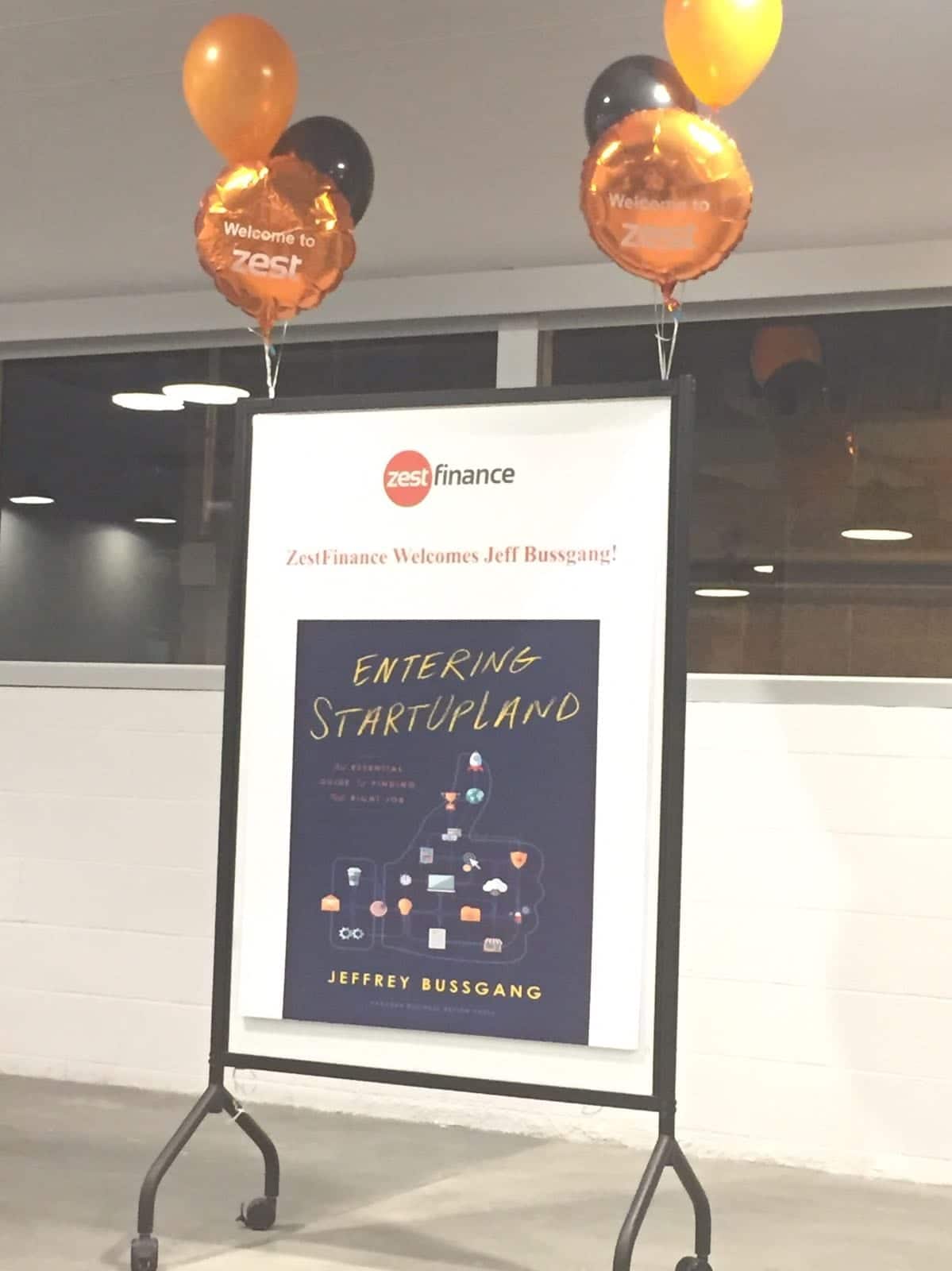Before you enter a Startup or before you choose your founding team or new hires read “Entering Startupland” by Jeff Bussgang.
Jeff knows how to spot and groom good culture, as the book session was held in Zestfinance a company he invested in and now, “The Best Workplaces for Women” and for “The Best Workplaces for Tech”, by Fortune.
These are the questions during the Book Launch.
How to know if a hire including the founder is Startup material?
Jeff says to watch for these qualities.
First, do the hires think like an owner?
Second, do the hires test the limits, to see how things can it be done better?
Are they problem solvers and are biased toward action?
Do they like managing uncertainty and being comfortable with uncertainty? And comfortable with rapid decision-making?
Are they comfortable with flexible enough to take in a series of undefined roles and task?
How do we know if we are simply too corporate to be startup?
Corporate mindsets more interested in going deep into a particular functional area? These corporate beings are more comfortable with clear and distinct lines of responsibility, control, and communication? They are more hesitant or unable to put in the extra effort because “it’s not my job”.
If you do still want to enter a startup despite the very small gains at the onset, Jeff offers a few key considerations on how to pick a right one.
He suggests you pick a city as each city has a different ecosystems stakeholders and funding sources and market strengths. You have to invest in the ecosystem and this is your due diligence. Understand it so you can find the best match when it arises.
Next, to pick a domain, research and solidify your understanding with every informational interview and discussion you begin. Then, pick a stage you are willing to enter at. They are usually 1)in the Jungle, 2) the Dirt Road or 3) the Highway. The Jungle has 1-50 staff and no clear path with distractions everywhere and very tough conditions. The Dirt Road gets clearer but is definitely bumpy and windy. Well the Highway speaks for itself, doesn’t it?
Finally Please – Pick a winner!
Ask people on the inside – the Venture Capitalists, the lawyers, the recruiters and evaluate the team quality like any venture capitalists would. Would you want to work for the team again and again? And is the startup working in a massive market? Is there a clear recurring business model?
After you have picked a winning team and product, how would you get in through the door?
You need to know that warm introductions have to be done. That’s the way to get their attention. Startups value relationships and people as they need social capital to grow. If you have little experience or seemingly irrelevant experience, go bearing a gift. Jeff shared a story of a young ambitious and bright candidate with no tech experience who went and did a thorough customer survey of the users of the startup she intended to work with. She came with point-of-view and presented her findings, and they found in her, what they needed at that stage. She became their Director of Growth. Go in with the philosophy of adding value-add you can get any job you want.
And as any true advisor would do, Jeff did not mince his words, when he reminded the audience that, “If you can’t get introduced you may not be resourceful enough to be in startup.”
Startupland is not a Traditional Career or Learning Cycles
Remember to see your career stage as a runs of 5 years, 8 or 10 – it is not a life long career. In Startup land consider each startup as a single career for you.
Douglas Merrill, founder of Zestfinance added from his hard-earned experience that retention is a challenge. Startup Leaders to keep your people, do help them with the quick learning cycles. Essentially from Jungle to Dirt road, the transition can be rapid and so each communication model that starts and exists, gets changed quickly. Every twelve months, the communication model will have no choice but to break down and you have to reinvent the communication model. Be ready as a founder and be ready as a member of the startup.
Another suggestion was to have no titles for first two years. So that everyone was hands-on and also able to move as one entity.
Effective Startupland Leaders paint a Vision of the Future yet unseen.
What I really enjoyed and resonated with as a coach and psychologist was how Douglas at the 10th hire thought very carefully what he was promising each of his new team member. He was reminded that startups die at their 10th and their 100th hires. He took some mindful down time and reflected. He then wrote a story for each person in his own team and literally wrote out what the company would look like and their individual part in it. In He writing each of the team members’ stories into his vision and giving each person this story, it was a powerful communication piece. He definitely increased the touch points and communication here is the effective startup’s leverage.
Douglas and Jeff both suggested transparency from the onset.
If you think like an owner and if you think of your founding team as problem solvers. Then getting transparent about financials with your team is probably a good idea. As a member of a startup, you should insist on knowing these things
Such skills and domain knowledge will be valuable. There is now historical evidence of people leaving startups and being a successful founder themselves because they were in the financial trenches in their initial startup. Think Paypal and Facebook Mafia.
What drives people to enter a startup?
The whole nature of work is changing. Many are ready to pay to learn. Daniel Pink’s book Drive showed how people are motivated by certain qualities like Mastery, Autonomy and Where your work fits into big picture. Startups do that naturally. There is a huge amount of passion and the quality of team today and as it grows then the quality of company changes.
The Progress principle is in place, why people love their startup jobs is not money rather are my contributions being valued? Do I see a path of progress and do I have autonomy over work and am I treated well?


































